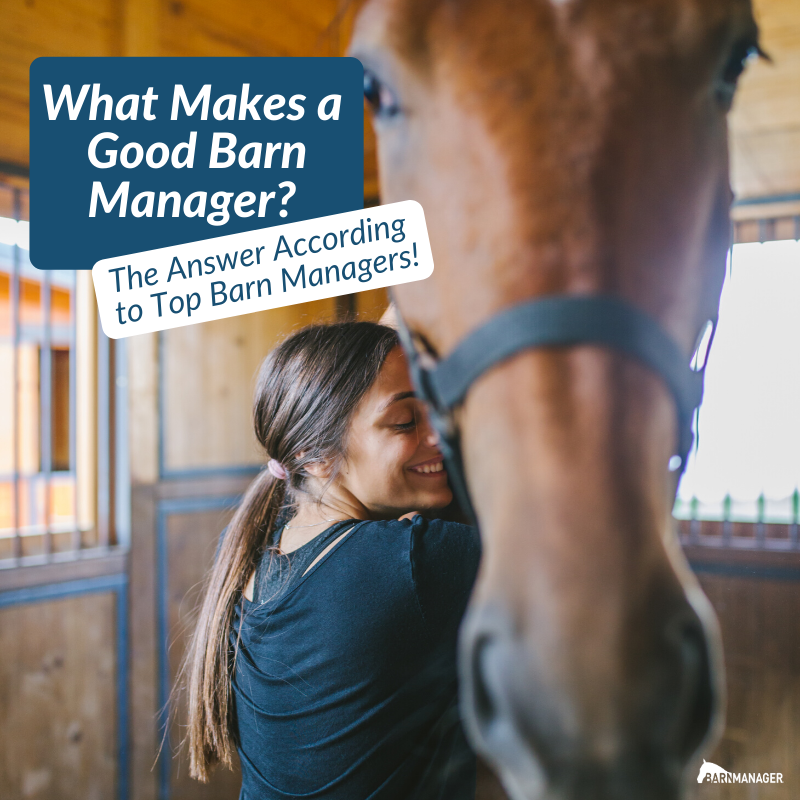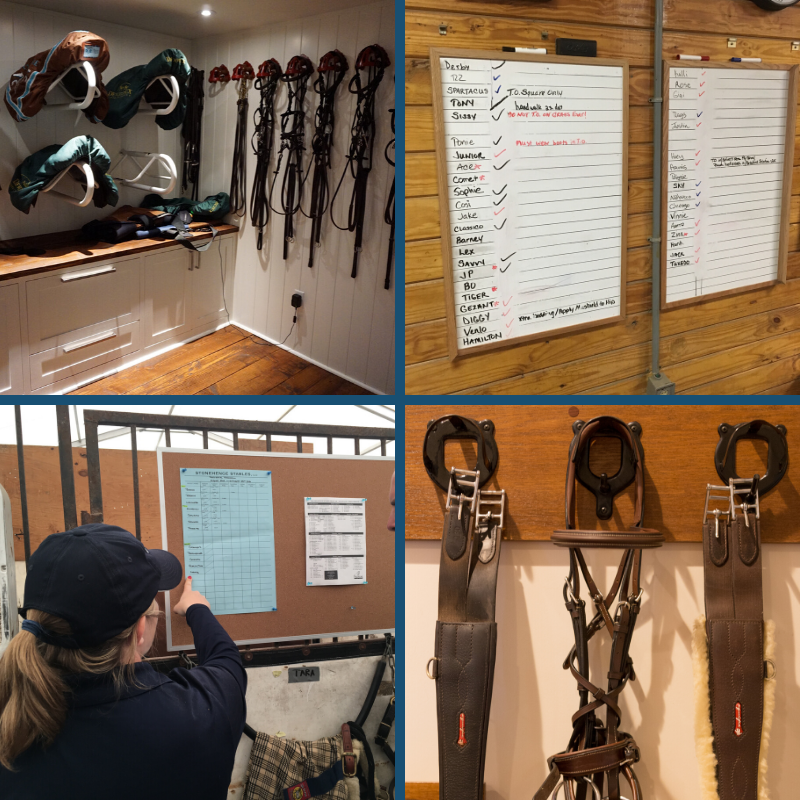
What Makes a Good Barn Manager? The Answer According to Barn Managers
Behind every great barn is a great barn manager, but what is it that makes someone an exceptional barn manager? We gathered insight from barn managers themselves to find out what it takes to excel in the role.
Defining the Role
 Before we delve into what it is that makes a good barn manager, let’s definite what the barn manager’s role entails. While this varies from discipline to discipline and from barn to barn, the first priority is generally the proper care and maintenance of the horses. That might mean overseeing:
Before we delve into what it is that makes a good barn manager, let’s definite what the barn manager’s role entails. While this varies from discipline to discipline and from barn to barn, the first priority is generally the proper care and maintenance of the horses. That might mean overseeing:
– feeding, supplements, and all of the horses’ nutritional needs and any medications
– turn-out schedules
– horses’ exercise routines
– the cleaning of stalls, as well as barn cleaning and maintenance
– vet, farrier, and specialist appointments and scheduling
– the ordering of supplies and feed
– and more!
If the barn has a competitive show program, the manager is also likely in charge of all aspects of the horse show schedule, including arranging transportation for the horses, making packing lists, submitting horse show entries, ensuring the horses are up-to- date on health matters such as vaccinations required by show managers, and organizing the necessary veterinary paperwork and/or passports.
The horse care aspects of the job can themselves fill up a rather lengthy list, but the tasks of a typical barn manager don’t stop there! In fact, for many barn managers, the management of people is as much, or even much more so, a part of the job as the management of horses.
Barn managers are often also in charge of the small business operations side of running the farm as well, including:
– employee schedules and payroll
– the hiring and training of new employees
– accounts receivable and payable
– lesson scheduling and coordinating.
So, what does it take to be good at the job? Here are four key traits of a good barn manager, as identified by a few top barn managers themselves:
Communication is Key
A barn manager is often the one interacting with both employees and clients on a daily basis, and therefore he or she needs to be an effective communicator with the ability to also listen to and work with others, and to deal with any conflict or problems should they arise. Being a good communicator is one of the first things many barn managers identify as a key trait, but it is also one that is quickly identified as one of the biggest challenges of the job.
“Learning to delegate and communicate [is one of the biggest challenges of the job],” said Emma Ford, who manages for Olympic eventer Phillip Dutton. “I am on the road with the advanced horses a lot through the show season. Being able to establish an at-home team that can keep the barn running smoothly is key.”
Courtney Carson, manager for Doug Payne and Payne Equestrian voiced similar comments on the importance of communication for she and her team.
“We are a 60/40 split between 3-day event horses and hunter/jumpers, so there is always a lot going on. This keeps us on the road quite a bit with very little turnover time while at home,” said Carson. “It is very important that I have a good crew at home who communicates well, and we all work cohesively together. I would much rather hear from six people that we need to order hay or grain than come home to nothing, and I have to jump in the truck immediately and go pick some up as soon as the store is open.”
Extensive Horse Knowledge
Since he or she is often the one overseeing each horse’s daily care and feeding, it’s important for the barn manager to have a solid understanding of equine nutrition, basic equine medical treatments, and all elements of daily horse care.
A good barn manager should have extensive experience in caring for horses, as well as equine first-aid knowledge and a solid understanding of equine nutrition.
The Ability to Multi-Task – While Staying Organized
“There are a lot of moving pieces that make a barn run efficiently. Being  able to manage all of that is probably the trickiest part,” said Kassie Gustafson, barn manager for top hunter rider Hunt Tosh and his Hunt Tosh Inc.
able to manage all of that is probably the trickiest part,” said Kassie Gustafson, barn manager for top hunter rider Hunt Tosh and his Hunt Tosh Inc.
With so many tasks on a barn manager’s list of responsibilities, staying organized and getting ahead of all of them is key.
“I like to make sure that everything is organized when I close up shop every day,” said Molly Sewell Schott of Over the Hill Farm. “It saves time in the morning. I would rather stay at the barn later and then have everything smooth and efficient in the mornings, as far as tack being perfectly organized and that sort of stuff.
“I like everything to be done the night before because you have very limited hours in the morning. When I get to the barn, I want to be able to pull every piece of tack out of the trunk and have it exactly where it needs to be before everyone starts riding. I even pack the trunk at night based on what we’re doing first, so I’ll put the schooling bridles on the top so that we can just get them out and get the horses out the door and to the ring.”
Denise Moriarty, manager for show jumper Kent Farrington, said: “Being organized is going to make it run a lot smoother and be a lot less stressful. I make sure that my boots are laid out, that my ring bag is packed for that horse, and that I know what bit or bridle or chain and everything that [Kent] wants on the horse so that I’m not last minute panicked trying to figure that stuff out.”
A Love of, and a Dedication to, Horses
Barn management is not a 9-5 job. It can often mean long hours and 24/7 availability should a problem or emergency situation arise, and the horses in the program are likely never far out of the barn manager’s mind even when he or she is away from the barn.
Dedication to the job and a love of the horses is a key to not only success as a great barn manager, but also to true enjoyment of the job.
“Truly bonding with each horse [is the most rewarding part of the job],” said Ford. “Knowing them well enough that a slight change in attitude or eye alertness means catching a health problem before it becomes too big.”
“Love [the horses] like they are your own,” said Carson on one of her biggest tips for the job.
Carson also shared a few final pieces of advice for those considering, or currently in, a barn manager role.
“Communicate with your boss about how they want things done, and remember that everyone is on the same team,” said Carson. “Never stop learning though, talk to other grooms, talk to vets and farriers, read articles, and keep an open mind. Things will work for some horses and not others, that doesn’t make them wrong. Don’t ever be afraid to ask for help. Most importantly, find out what kind of treats your horses like the best and keep those on autoship through Amazon, Chewy, or Smartpak!”